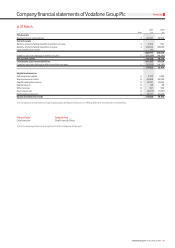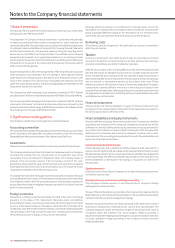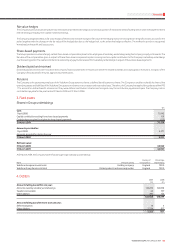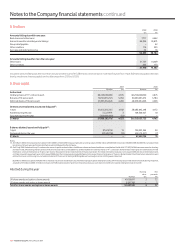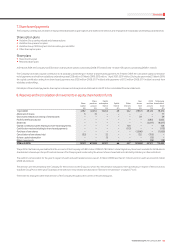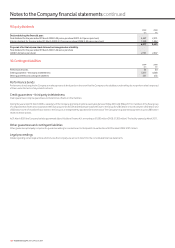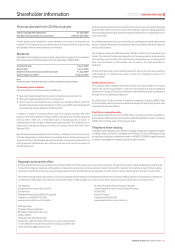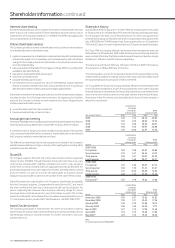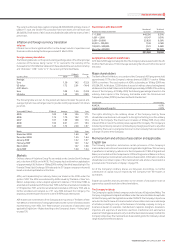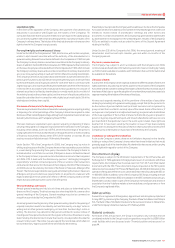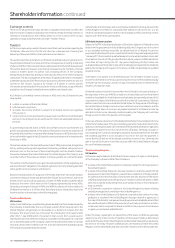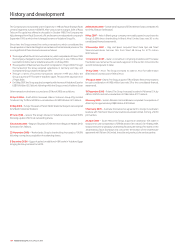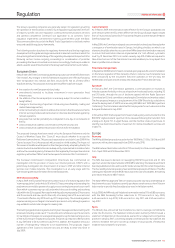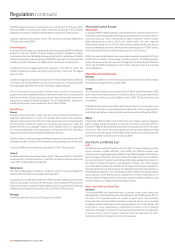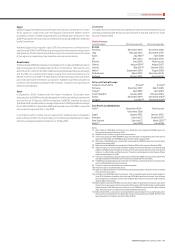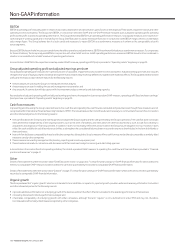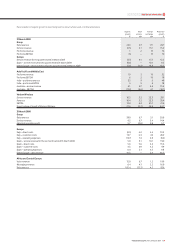Vodafone 2009 Annual Report Download - page 133
Download and view the complete annual report
Please find page 133 of the 2009 Vodafone annual report below. You can navigate through the pages in the report by either clicking on the pages listed below, or by using the keyword search tool below to find specific information within the annual report.
Vodafone Group Plc Annual Report 2009 131
Additional information
Shareholders must provide the Company with an address or (so far as the Companies
Acts allow) an electronic address or fax number in the United Kingdom in order to be
entitled to receive notices of shareholders’ meetings and other notices and
documents. In certain circumstances, the Company may give notices to shareholders
by advertisement in newspapers in the United Kingdom. Holders of the Company’s
ADSs are entitled to receive notices under the terms of the Deposit Agreement
relating to the ADSs.
Under Section 336 of the Companies Act 2006, the annual general meeting of
shareholders must be held each calendar year and within six months of the
Company’s year end.
Electronic communications
The Company may, subject to and in accordance with the Companies Act 2006,
communicate all shareholder information by electronic means, including by making
such information available on a website, with notification that such information shall
be available on the website.
Variation of rights
If, at any time, the Company’s share capital is divided into different classes of shares, the
rights attached to any class may be varied, subject to the provisions of the Companies
Acts, either with the consent in writing of the holders of three fourths in nominal value of
the shares of that class or upon the adoption of an extraordinary resolution passed at a
separate meeting of the holders of the shares of that class.
At every such separate meeting, all of the provisions of the articles of association
relating to proceedings at a general meeting apply, except that (a) the quorum is to
be the number of persons (which must be at least two) who hold or represent by
proxy not less than one third in nominal value of the issued shares of the class or, if
such quorum is not present on an adjourned meeting, one person who holds shares
of the class regardless of the number of shares he holds, (b) any person present in
person or by proxy may demand a poll, and (c) each shareholder will have one vote
per share held in that particular class in the event a poll is taken. Class rights are
deemed not to have been varied by the creation or issue of new shares ranking
equally with or subsequent to that class of shares in sharing in profits or assets of the
Company or by a redemption or repurchase of the shares by the Company.
Limitations on voting and shareholding
As far as the Company is aware, there are no limitations imposed on the transfer,
holding or voting of the Company’s shares other than those limitations that would
generally apply to all of the shareholders. No shareholder has any securities carrying
special rights with regard to control of the Company.
Documents on display
The Company is subject to the information requirements of the US Securities and
Exchange Act of 1934 applicable to foreign private issuers. In accordance with these
requirements, the Company files its annual report on Form 20-F and other related
documents with the SEC. These documents may be inspected at the SEC’s public
reference rooms located at 100 F Street, NE Washington, DC 20549. Information on the
operation of the public reference room can be obtained in the US by calling the SEC on
+1-800-SEC-0330. In addition, some of the Company’s SEC filings, including all those
filed on or after 4 November 2002, are available on the SEC’s website at www.sec.gov.
Shareholders can also obtain copies of the Company’s memorandum and articles of
association from the Vodafone website at www.vodafone.com/governance or from
the Company’s registered office.
Debt securities
Pursuant to an Agreement of Resignation, Appointment and Acceptance, dated as of
24 July 2007, by and among the Company, The Bank of New York Mellon and Citibank
N.A, The Bank of New York Mellon has become the successor trustee to Citibank N.A.
under the Company’s Indenture dated as of 10 February 2000.
Material contracts
At the date of this annual report, the Group is not party to any contracts that are
considered material to the Group’s results or operations, except for its US$9.1 billion
credit facilities which are discussed under “Financial position and resources” on
page 44.
Liquidation rights
In the event of the liquidation of the Company, after payment of all liabilities and
deductions in accordance with English law, the holders of the Company’s 7%
cumulative fixed rate shares would be entitled to a sum equal to the capital paid up
on such shares, together with certain dividend payments, in priority to holders of the
Company’s ordinar y shares. The holders of the f ixed rate shares do not have any other
right to share in the Company’s surplus assets.
Pre-emptive rights and new issues of shares
Under Section 80 of the Companies Act 1985, directors are, with certain exceptions,
unable to allot relevant securities without the authority of the shareholders in a
general meeting. Relevant securities as defined in the Companies Act 1985 include
the Company’s ordinary shares or securities convertible into the Company’s ordinary
shares. In addition, Section 89 of the Companies Act 1985 imposes further restrictions
on the issue of equity securities (as defined in the Companies Act 1985, which include
the Company’s ordinary shares and securities convertible into ordinary shares) which
are, or are to be, paid up wholly in cash and not first offered to existing shareholders.
The Company’s articles of association allow shareholders to authorise directors for a
period up to five years to allot (a) relevant securities generally up to an amount fixed
by the shareholders and (b) equity securities for cash other than in connection with
a rights issue up to an amount specified by the shareholders and free of the restriction
in Section 89. In accordance with institutional investor guidelines, the amount of
relevant securities to be fixed by shareholders is normally restricted to one third of
the existing issued ordinary share capital, and the amount of equity securities to be
issued for cash other than in connection with a rights issue is restricted to 5% of the
existing issued ordinary share capital.
Disclosure of interests in the Company’s shares
There are no provisions in the articles of association whereby persons acquiring, holding
or disposing of a certain percentage of the Company’s shares are required to make
disclosure of their ownership percentage, although such requirements exist under rules
derived by the Disclosure and Transparency Rules (‘DTRs’).
The basic disclosure requirement upon a person acquiring or disposing of shares
carrying voting rights is an obligation to provide written notification to the Company,
including certain details as set out in DTR 5, where the percentage of the person’s
voting rights which he holds as shareholder or through his direct or indirect holding
of financial instruments (falling within DTR 5.3.1R) reaches or exceeds 3% and
reaches, exceeds or falls below each 1% threshold thereafter.
Under Section 793 of the Companies Act 2006, the Company may, by notice in
writing, require a person that the Company knows or has reasonable cause to believe
is, or was during the preceding three years, interested in the Company’s shares to
indicate whether or not that is correct and, if that person does or did hold an interest
in the Company’s shares, to provide certain information as set out in the Companies
Act 2006. DTR 3 deals with the disclosure by persons “discharging managerial
responsibility” and their connected persons of the occurrence of all transactions
conducted on their account in the shares in the Company. Part 28 of The Companies
Act 2006 sets out the statutory functions of the Panel on Takeovers & Mergers (the
‘Panel’). The Panel is responsible for issuing and administering the Code on Takeovers
& Mergers and governs disclosure requirements on all parties to a takeover with
regard to dealings in the securities of an offeror or offeree company and also on their
respective associates during the course of an offer period.
General meetings and notices
Annual general meetings are held at such times and place as determined by the
directors of the Company. The directors may also, when they think fit, convene other
general meetings of the Company. General meetings may also be convened on
requisition as provided by the Companies Act 2006.
An annual general meeting and any other general meeting called for the passing of
a special resolution needs to be called by not less than twenty-one days’ notice in
writing and all other general meetings by not less than fourteen days’ notice in
writing. The directors may determine that persons entitled to receive notices of
meetings are those persons entered on the register at the close of business on a day
determined by the directors but not later than twenty-one days before the date the
relevant notice is sent. The notice may also specify the record date, which shall not
be more than forty-eight hours before the time fixed for the meeting.


